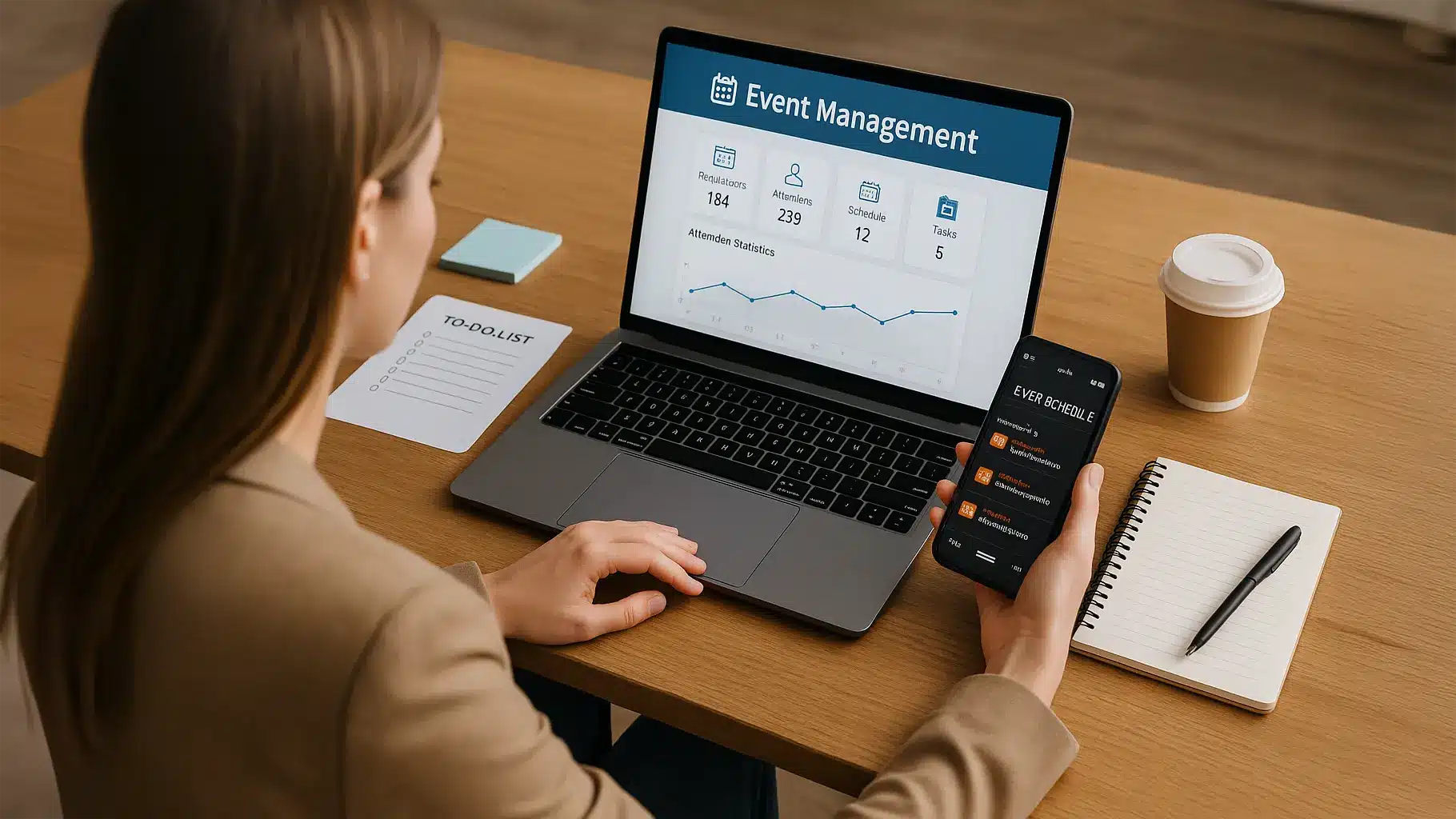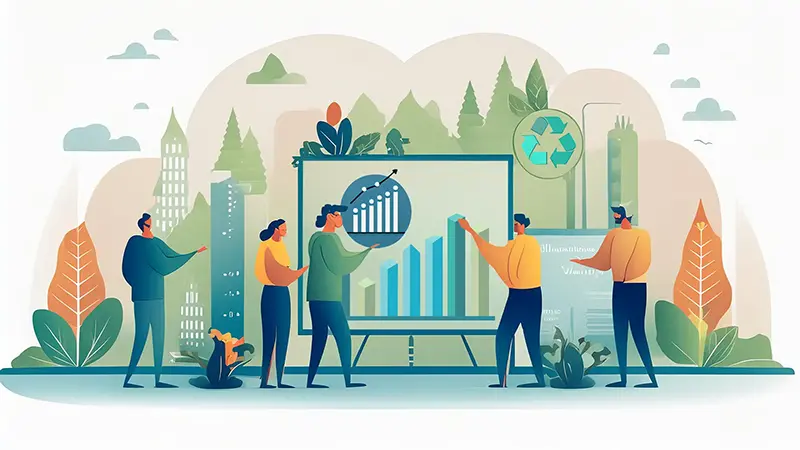Events are more than just a sequence of program items. They are experiences that bring people together, convey messages, and leave lasting impressions. However, careful organization is required to ensure that an event is celebrated with applause at the end. This is exactly where event organization comes in: it forms the common thread from the initial idea to the successful conclusion.
This article provides a step-by-step guide that takes you through all the important phases of event organization. You will learn how to turn an initial idea into a structured concept, which planning steps are essential, and how clear preparation will enable you to act confidently on the day of the event. You will also find tips on how to avoid typical mistakes and use helpful tools.
The idea: The beginning of every event organization
Every successful event begins with a strong idea. It is the creative core that determines all further decisions: from the theme to the location to the marketing. Without a clear idea, there is no common thread that makes the event unique and relevant to the target audience.
-
Why is the event taking place?
(Goals, message, benefits) -
Who is this event intended for?
(Target group, needs, expectations) -
What makes this event special?
(Theme, experience factor, differentiation from other events)
- Team brainstorming: Many minds often provide the best ideas.
- Mind mapping: Helps to visualize different approaches and connect them with each other.
- Benchmarking: Drawing inspiration from successful events in the industry without copying them.
- Storytelling: Think about what story your event should tell.
Planning: Ideas become structure
Once the event idea has been finalized, the real work begins: planning. In this phase, the creative vision is transformed into a clear concept with measurable goals, budget, processes, and responsibilities. Good planning is the foundation of any successful event organization, because it ensures that all the pieces fit together in the end.
Set specific goals that you can review later. Work according to the SMART method (specific, measurable, attractive, realistic, time-bound).
Examples:
- “Generate 100 new leads at a trade fair”
- „Mitarbeiterzufriedenheit durch ein Sommerfest steigern“
- “Increase brand awareness at an industry event”
The budget is the framework within which you implement your ideas.
- Take into account fixed costs (location, technology, catering) and variable costs (marketing, staff, decorations).
- Planen Sie einen Puffer von mindestens 10 bis 15 Prozent für Unvorhergesehenes ein.
- Work with a clear budget table to keep track of everything at all times.
The choice of location shapes the character of the event. Criteria may include:
- Accessibility and connections
- Capacity and equipment
- Atmosphere and image
- Technical infrastructure
Service providers such as catering, technology, or moderation should be contacted early on and included with clear contracts.
Create a project plan with milestones:
- When should invitations be sent out?
- When is the registration deadline?
- When will construction begin?
Responsibilities within the team should be clearly defined. Who is responsible for marketing, who for participant management, who for technology? This is the only way to turn planning into a structured process.
Preparation: Everything you need for a smooth process
Once the goals, budget, and location have been determined, concrete preparations come to the fore. This is where it is decided whether your event will run smoothly on the day or whether unnecessary hurdles will arise. Preparation means clarifying details and ensuring communication with all parties involved.
No matter how well planned an event may be, without the right guests it will remain empty. That is why event marketing is a central part of the preparation process.
- Channels: Social media, newsletters, personal invitations, press relations
- Message: Short, clear, and tailored to the target audience
- Timing: Start early, schedule reminders
Professional participant management saves time and stress.
- Online registration simplifies the process
- Clear confirmation and reminder emails provide guidance
- Transparent check-in speeds up the process on the day of the event
The use of digital tools is particularly helpful during the critical phase of preparation.
- Project management tools
- Communication tools
- event management software

How to manage events efficiently: an overview of methods and tools
Manage events efficiently—with proven tools, clear processes, and a practical step-by-step plan.

9 ideas for successful event marketing
Event marketing thrives on emotions, and with these 9 ideas, you can create events that attract attention, bring in new contacts, and bring your brand to life.
The applause: follow-up and measuring success
When the event is over, it doesn’t mean that the event organization ends. The follow-up is just as important as the planning, because it determines whether the applause is just a momentary thing or whether it has a lasting effect.
- Right on site: Short feedback forms or digital surveys via QR code
- After the event: online surveys, telephone interviews, or feedback discussions
- Social media monitoring: Mentions, comments, and shared content provide valuable insights
Success can only be measured if goals have been defined beforehand. Typical key figures are:
- Number of participants compared to registrations
- Leads or new contacts gained through the event
- Media coverage and reach
- Participant satisfaction (e.g., NPS score)
- budget compliance
An event offers the opportunity to strengthen relationships in the long term.
- Follow-up emails: Thank you to participants with links to presentation slides or photos
- Continue networking: Make LinkedIn contacts, set up community groups
- Use content: Recordings, images, or blog posts extend the reach of the event.
Avoiding common pitfalls when traveling
Even with the best planning, mistakes can happen. Some are easy to correct, while others can have a massive impact on an event. If you know the most common pitfalls, you can take targeted countermeasures and ensure your event is a success.
- Unclear goals and expectations
Without clear objectives, event organization is like a journey without a destination. Participants don’t know what to expect, and the organizing team lacks a common focus.
💡 Tip: Define goals in writing, preferably using the SMART method, and coordinate them with all parties involved.
- Underestimated budget
Many events fail due to a lack of financial buffers. Unexpected costs for technology, staff, or catering can blow the budget.
💡 Tip: Always plan for a 10 to 15 percent reserve and check your expenses regularly.
- Lack of communication with service providers
If information is not communicated clearly and in a timely manner, misunderstandings and delays arise.
💡 Tip: Hold regular meetings and document agreements in writing.
- Not enough time for preparation
Many mistakes arise from preparation phases that are calculated too tightly. Hecticness increases the risk of failures or forgotten details.
💡 Tip: Start planning as early as possible, ideally several months in advance.
- Neglected follow-up
Not following up after the event means wasting valuable contacts and learning opportunities.
💡 Tip: Plan follow-up activities during the preparation phase.

10 tips for efficient event planning
Efficient event planning: Discover 10 practical tips for successful events – from budget planning and digital tools to participant management.
Which tools help with event organization?
Event organization involves many different tasks that often run parallel to each other and influence each other. Without digital support, things can quickly become confusing, especially when several people or departments are involved. Modern tools help to create order and make workflows more efficient.
- Project management and planning as a team
Digital solutions for project management make it possible to create transparent schedules and clearly assign responsibilities. Whether it’s meeting deadlines, planning resources, or collaborating on documents, these planning and control tools lay the foundation for structured organization.
- Communication with all parties involved
Internal teams, external service providers, and sponsors work together in event organization. Communication platforms ensure that information is not lost and that everyone involved has the same level of knowledge. Automated email systems are also helpful for reliably informing guests about registrations, confirmations, or program changes.
- Implementing professional participant management
Professional participant management is crucial for ensuring that everything runs smoothly. Online registration forms simplify the registration process, digital check-in solutions speed up reception, and reminder emails give guests peace of mind. This creates a positive experience right from the start.
- Interactive tools for the event
Digital applications can make all the difference during the event. Live polls and Q&A sessions encourage active participation. Event apps with program information, site maps, and push notifications provide orientation, while networking features create targeted connections between participants.
- Analysis and feedback after the event
After the event, analysis and feedback tools help to visualize its success. Dashboards provide key figures such as participant numbers or satisfaction at a glance, while digital surveys enable valuable feedback for future events. This allows experiences to be systematically incorporated into the planning of future events.

Event management software comparison: categories, use, and providers
Which event management software is right for your use case? We show you categories, possible applications, and suitable tools.
Trends and the future of event organization
Event organization is constantly evolving. While some aspects have become commonplace, new priorities are emerging that will have a lasting impact on the industry. Keeping an eye on these developments will enable you to make events even more attractive, efficient, and relevant.
Sustainable events are no longer a niche topic, but are increasingly becoming an expectation. Participants pay attention to environmental compatibility, and partners to credible commitment.
- Resource-conscious planning with regional catering and reusable materials
- CO₂ compensation for arrival and departure
- Sustainability reports as part of follow-up work
Standard programs are losing their impact. Guests expect formats that are tailored to their interests and needs.
- Personalized agendas in event apps
- Interactive sessions instead of lectures
- Networking opportunities that bring specific contacts together
AI is becoming an important tool for improving planning and evaluation.
- Automated chatbots for participant questions
- AI-supported data analysis for measuring success
- Recommendations for program design or networking based on participant profiles
Events are increasingly seen as part of a long-term community strategy. The goal is not just applause at the end, but lasting relationships.
- Digital communities that remain active between events
- Content recycling: Making presentations, videos, and discussions available for use even after the event
- Continuous exchange via social media or proprietary platforms

Event-Community: Ständiges Engagement statt einmaliger Veranstaltung
Learn how event communities increase participant engagement and reach. With practical examples, tips and a look to the future.

Sustainable events with strategy
Mit unseren Tipps für nachhaltige Veranstaltungen können Sie für eine ökologische Bilanz sorgen und sogar Kosten und Aufwand sparen.
Conclusion
Event organization is a complex process that combines creativity, structure, and flexibility. From the initial idea to detailed planning, implementation, and follow-up, each phase determines the success of an event. Defining clear goals, realistically assessing budgets and resources, and using the right tools lays the foundation for an event that will be enthusiastically received by guests.
It is also important to avoid typical pitfalls such as unclear communication or a lack of buffers, and to keep an eye on trends. Sustainability, digital solutions, and community building are no longer marginal issues, but are part of the future of event organization.
In the end, it becomes clear that with a clear structure, a good team, and the right amount of flexibility, any event can be organized successfully, and with a little luck, all the effort will be rewarded with applause from the audience.
Frequently asked questions (FAQ)
What is event organization?
Event organization encompasses all steps from the initial idea to planning, implementation, and follow-up of an event.
How long does it take to organize an event?
The duration depends on the size and complexity. Small events can be organized in a few weeks, while larger conferences or festivals often take several months.
What are the responsibilities of an event organizer?
The most important tasks include defining objectives, budget planning, selecting the location, coordinating service providers, participant management, and performance review.
Which tools help with event organization?
Project management tools, communication solutions, and specialized event management software facilitate planning, participant management, and evaluation.
What are some common mistakes in event planning?
Common mistakes include unclear goals, an overly tight budget, insufficient buffer times, poor communication, and neglecting follow-up work.
How much does professional event organization cost?
The costs vary greatly depending on the size and requirements of the event. In addition to the location, technology, and catering, marketing and personnel should always be taken into account.


